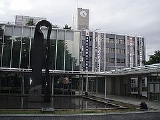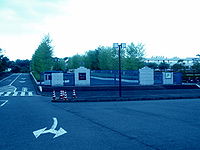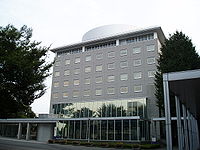
Kanagawa University
Encyclopedia
, abbreviated to is a private university
in Japan
. The main campus is located in Rokkakubashi, Kanagawa-ku
, Yokohama
, Kanagawa Prefecture
.
The university at first had three faculties: the Faculties of Commerce and Engineering and the evening school's Faculty of Commerce. The latter history of the university is as follows:


Private university
Private universities are universities not operated by governments, although many receive public subsidies, especially in the form of tax breaks and public student loans and grants. Depending on their location, private universities may be subject to government regulation. Private universities are...
in Japan
Japan
Japan is an island nation in East Asia. Located in the Pacific Ocean, it lies to the east of the Sea of Japan, China, North Korea, South Korea and Russia, stretching from the Sea of Okhotsk in the north to the East China Sea and Taiwan in the south...
. The main campus is located in Rokkakubashi, Kanagawa-ku
Kanagawa-ku, Yokohama
is one of the 18 wards of the city of Yokohama in Kanagawa Prefecture, Japan. As of 2010, the ward had an estimated population of 230,401 and a density of 9,650 persons per km²...
, Yokohama
Yokohama
is the capital city of Kanagawa Prefecture and the second largest city in Japan by population after Tokyo and most populous municipality of Japan. It lies on Tokyo Bay, south of Tokyo, in the Kantō region of the main island of Honshu...
, Kanagawa Prefecture
Kanagawa Prefecture
is a prefecture located in the southern Kantō region of Japan. The capital is Yokohama. Kanagawa is part of the Greater Tokyo Area.-History:The prefecture has some archaeological sites going back to the Jōmon period...
.
History
The university was founded in 1928 by as . It was an evening school for the working youth. In 1929 the school was renamed , which had both day and evening schools (Day school: Department of Commerce / evening school: Departments of Commerce and Law). On 15 May 1930 the college moved to present-day Rokkakubashi Campus. In 1939 it added the technical departments (Mechanical Engineering, Electrical Engineering and Industrial Administration). In 1949 the college was developed into Kanagawa University, under Japan's new educational system.The university at first had three faculties: the Faculties of Commerce and Engineering and the evening school's Faculty of Commerce. The latter history of the university is as follows:
- 1950: the Faculty of Commerce was renamed Faculty of Law and Economics.
- 1965: the Faculty of Foreign Languages (EnglishEnglish languageEnglish is a West Germanic language that arose in the Anglo-Saxon kingdoms of England and spread into what was to become south-east Scotland under the influence of the Anglian medieval kingdom of Northumbria...
and SpanishSpanish languageSpanish , also known as Castilian , is a Romance language in the Ibero-Romance group that evolved from several languages and dialects in central-northern Iberia around the 9th century and gradually spread with the expansion of the Kingdom of Castile into central and southern Iberia during the...
) was established.- the Faculty of Law and Economics was divided into two faculties.
- 1967: the Graduate Schools of Law (master's/doctoral), Economics (master's/doctoral) and Engineering (master's courses only) were established.
- 1989: Hiratsuka Campus was opened (Shonan Hiratsuka Campus today).
- the Faculties of Business Administration and Science were established.
- 1990: the doctoral courses were added to the Graduate School of Engineering.
- 1992: the Graduate School of Foreign Languages was established (master's courses only).
- 1993: the Graduate Schools of Business Administration, Science and History & Folklore Studies were established (master's courses only).
- 1995: the doctoral courses were added to the Graduate Schools of Business Administration, Science and History & Folklore Studies.
- 2004: the School of Law was established.
- 2006: the Faculty of Human Sciences was established.
Graduate schools


- Graduate School of Law
- Graduate School of Economics
- Graduate School of Business Administration (in Shonan Hiratsuka Campus)
- Graduate School of Foreign Languages
- Graduate School of Science (in Shonan Hiratsuka Campus)
- Graduate School of Engineering
- Graduate School of History & Folklore Studies
- School of Law
Undergraduate schools
- Faculty of Law
- Faculty of Economics
- Faculty of Business Administration (in Shonan Hiratsuka Campus)
- Faculty of Foreign Languages
- Faculty of Human Sciences
- Faculty of Science (in Shonan Hiratsuka Campus)
- Faculty of Engineering
Institutes
- Library
- Institute for Legal Studies
- Institute of Economics and Foreign Trade
- Institute of International Business and Management
- Institute for Humanities Research
- Center for Language Studies
- Research Institute for Integrated Science
- Institute for Technological Research
- Institute for the Study of Japanese Folk Culture

